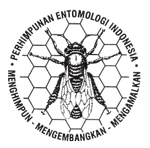Pengaruh temephos terhadap perolehan telur nyamuk Aedes aegypti (L) di cipinang muara jakarta
DOI:
https://doi.org/10.5994/jei.3.1.14Keywords:
Abaticidal ovitrap, Aedes aegypti, AbateAbstract
A study on the effect of abaticidal ovitrap on Aedes aegypti egg findings was carried out in Cipinang Muara, East Jakarta from October 1997 until January 1998. Twenty five houses were designed as treatment objects. Ovitrap were sit indoor and outdoor in each house. Seventy five houses were used as buffer. People in this area were trained on how to set up and to manage their ovitrap. Control area in the same "Rukun Warga (RW)" was selected and treated with the same way. The result has shown that egg number from the treated area has significantly reduced and less than the egg number in the control area. The mean the number of eggs found in the first year was 20.8 eggs, while in the second year was 38.8 eggs. The average ovitrap index (01) in the first year was 38.8 'Yo, while in the second year was 49.4 %. Abate did not affect the activity of oviposition and the number oflaid eggs.Downloads
Download data is not yet available.
Downloads
Published
2017-02-23
How to Cite
Hasyimi, M., Suwarto, S., Waluyo, W., Mardiana, M., Suyitno, S., Sukijo, S., & Supriyono, S. (2017). Pengaruh temephos terhadap perolehan telur nyamuk Aedes aegypti (L) di cipinang muara jakarta. Jurnal Entomologi Indonesia, 3(1), 14. https://doi.org/10.5994/jei.3.1.14
Issue
Section
Articles
License
Authors who publish with this journal agree to the following terms:
- Authors retain copyright and grant the journal right of first publication with the work simultaneously licensed under a Creative Commons Attribution 4.0 International License that allows others to share the work with an acknowledgement of the work's authorship and initial publication in this journal.
- Authors are able to enter into separate, additional contractual arrangements for the non-exclusive distribution of the journal's published version of the work (e.g., post it to an institutional repository or publish it in a book), with an acknowledgement of its initial publication in this journal.
- Authors are permitted and encouraged to post their work online (e.g., in institutional repositories or on their website) prior to and during the submission process, as it can lead to productive exchanges, as well as earlier and greater citation of published work (See The Effect of Open Access).








